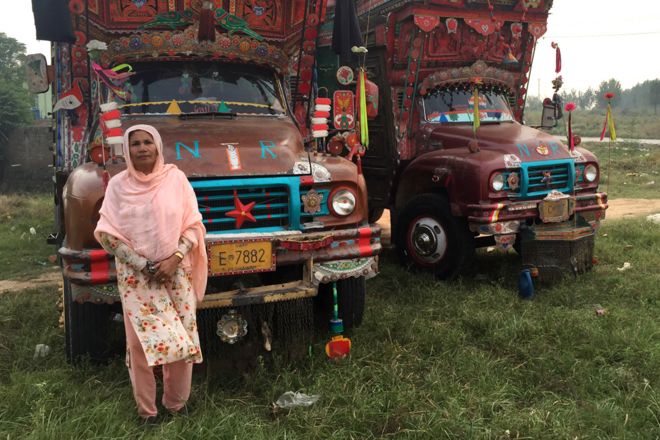
All over the world it's the same - a woman driving a lorry gets funny looks and has to listen to unfunny jokes. It's a career women are not expected to choose, it seems, and often one they don't even consider. But why not? The job no longer requires brute strength and some women who do it say they love it.
"When I'm out on the road and a wagon will go past I do actually feel like I've got three heads because they do look about three or four times as if to say, 'What a young girl driving a wagon?'"
Natalie Tipton is a 28-year-old lorry driver based in north-east England, but her experience is not unique. It's one that Ellen Voie of the US-based Women in Trucking Association also recognises.
"It's interesting to see what peoples' reactions are when a female jumps out of the driver's seat. They usually get looks from people like, 'Wow I didn't know women could drive trucks, I didn't know women did drive trucks.'"
And in Pakistan, a country with only one woman lorry driver - Shamim Akhtar - some people on the street in Islamabad didn't just think it was an odd career choice, but morally wrong.
"I think that for this lady who drives a truck, this profession does not suit her being a woman," said one man. "It is a very tough and difficult job. If she wants to she can do something else. And if she wants to drive then maybe she should just drive a smaller car."
Only 1.2% of drivers of HGVs, or heavy goods vehicles, in the UK are women and it's a similar story across Europe. In the US it's a little higher at 5.8 % but women are still very much in the minority.
So while it may be that only a minority of drivers live up to the stereotype - brawny, macho and dressed in a lumberjack shirt - lorry driving is, at present, still largely a man's world. And women who venture into it often have a lot to put up with.
"You have to be quite thick-skinned. You have to be quite ballsy as well. Just because you're in such a male-orientated environment and because there is quite a lot of banter," says Natalie.
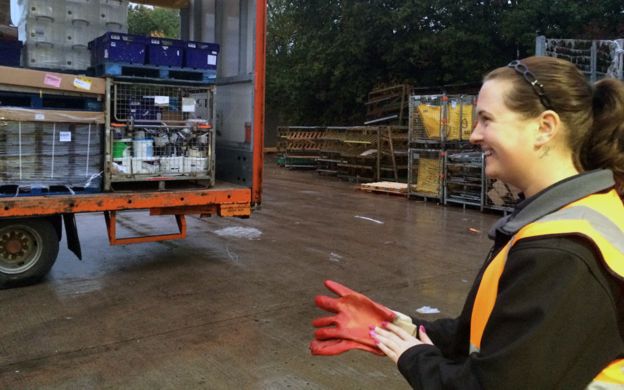
"You do get quite a lot of joking about and you do have to realise that it is just a joke and they're not being serious. That's just how men are so... if they were to make a sexist joke you wouldn't take it personally."
Natalie mentions a time when a male driver said: "I bet you ran a mile when you first got into your truck."
"And I said, 'Why's that?' and he said, 'Because it didn't have a kitchen sink in.' I said, 'Ha ha, very funny.'"
Jenny Tipping, another British trucker, who works as a "trunker" driving overnight along deserted motorways, has also been subjected to this kind of humour.
"I've had people saying, 'You can't possibly be a truck driver because you're wearing a skirt, or you're straight,'" she says.
And it annoys her that it's not only men who subscribe to the stereotype.
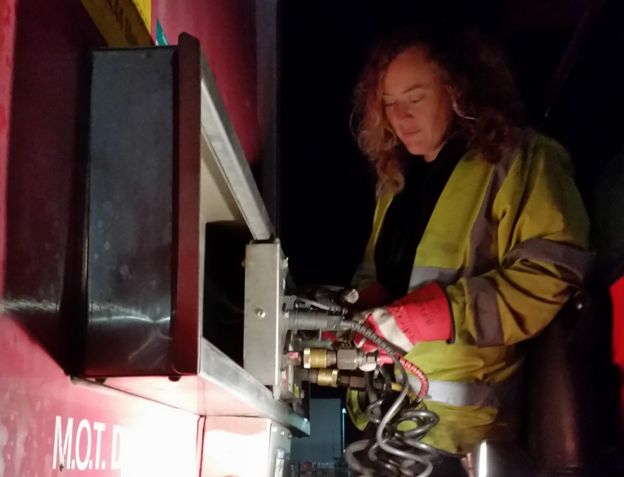

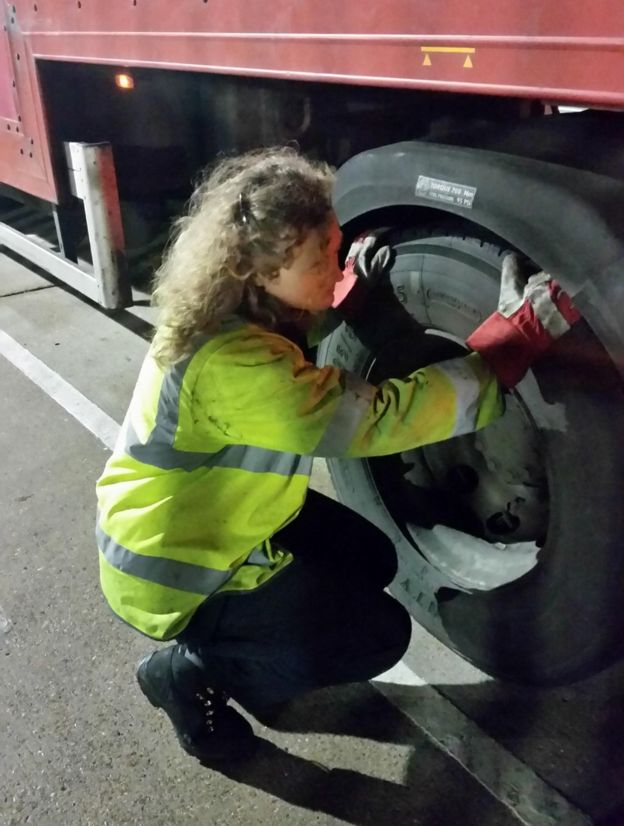
"One of the most common responses I get is, 'I couldn't drive that big thing, I couldn't even park my Mini,' which I think is a shame, because I suspect that woman probably can park her Mini," she says.
"It's so closely linked this idea of women not being any good at spatial tasks. I think a lot of women who are actually perfectly capable of driving, they talk themselves out of it. They just assume that because they are female they won't have those skills or they won't be able to learn them as fast as a man. And it's absolute rubbish. I have seen no evidence for it in any of the jobs I have done."
Shamim in Pakistan, however, says that in the few months since she qualified she has come to feel accepted by her male colleagues, and that when her lorry breaks down on the road people are always keen to help her.
"Some come and ask my colleagues who I am. Then my colleagues tell them, 'She is like our mother and she is also a truck driver.' That amazes them and they are very happy to see a woman driving," she says.

Natalie, Jenny and Shamim came to trucking for different reasons. Shamim had five children to support and needed money to send them to school as her husband, a gardener, didn't earn enough to cover the fees. First she worked as a car driving instructor, then progressed to vans and passed the test in Islamabad this summer for the largest lorries, at the age of 53.
Natalie, for her part, took up lorry driving after a year out of work, with encouragement from her mother, who at the time ran a small lorry-driving business.
Jenny, meanwhile, only chose the job after completing two Masters degrees, and starting a PhD. The "opportunity to just think" is one of the things she loves about the job. Another is taking in the world around her as she drives - the wildlife, or the phases of the moon.
"Driving up it wasn't quite dark when I set off so I had about an hour or two of daylight before it got dark," she said in an audio diary recorded for the BBC during one of her overnight shifts.
"Autumn is an absolutely stunning season to be driving because the hedgerows are just fantastic. You drive along the motorway and everyone thinks that it's a really brutal atmosphere but if you are high up, as you are in a lorry, you can see the trees, you can see the shrubs, you can see the birds, you can see kestrels ready to swoop down... People think of it as quite a dirty job, and in a way it is, but you can get out and about and see nature in a way that you never can in an office."
These days trucking involves no hard physical exertion.
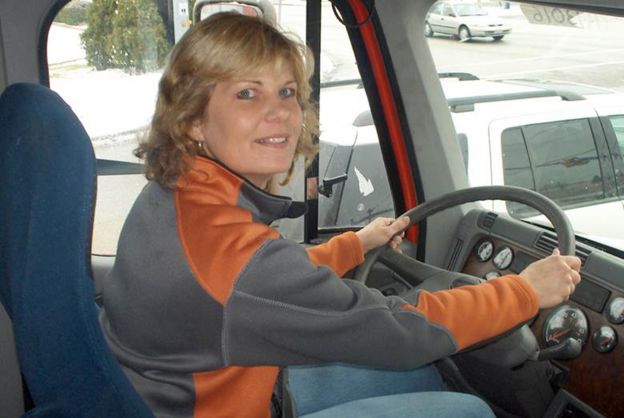
"There is a misconception that you need to be big, strong, burly and mechanically adept," says Ellen Voie, whose organisation campaigns to get more women into lorry driving in the US. Automatic gears and hi-tech suspension have helped make driving large vehicles much easier, she says, and it's no longer a job involving a lot of manual labour.
"The equipment has changed so much. There's automated transmissions, there's 'air-ride' everything and a lot of technology in the trucks. Drivers are home a lot more often, and they don't have to unload their trucks - it's just dropping their trailer and hooking up another one and taking off again."
There is, however, one aspect of the job which arguably puts women at a disadvantage, and that is the necessity for the long-distance driver to spend nights parked up in a truck stop.
Ellen's association advises women drivers not to park at the back of the parking lot, and not to walk between trucks, to reduce the risk of harassment. It's also working with US firms to improve truck design and install alarm systems which turn the lights on blast the horn if anyone tries to break in.
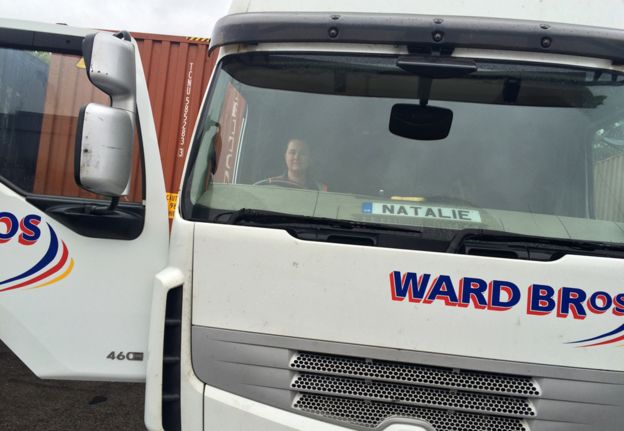
Natalie has found that when she spends a night in the cab, she has to sleep "with one eye open", so she has given up overnight journeys.
These are problems that there will soon be an urgent need to resolve, because it seems unlikely that men alone will be able to make up for a serious shortage of drivers. Currently 45,000 drivers are needed in the UK, and a similar number in the US. And this problem will only get worse, as many existing drivers are approaching retirement - 72% in the UK are over the age of 45.
Women react differently to walking into this traditional male environment.
"The day that I passed my HGV test I went out and I think I bought a new set of underwear and some leg wax," says Jenny. "There are some things that people who know me might be surprised that I bother with, like painting my toe nails or getting my eyebrows done. But I think because I do such a masculine job, I quite like to maintain a certain standard of girliness."
Shamim's advice on the other hand is to "kill the woman inside".
"I actually don't feel like a woman any more. I wish that God protects all women so that they don't feel compelled to leave their home to earn a livelihood but if they have to do it because of financial constraints then they should forget that they are women they should only concentrate on the work and kill the woman they are inside… she only needs to be courageous."
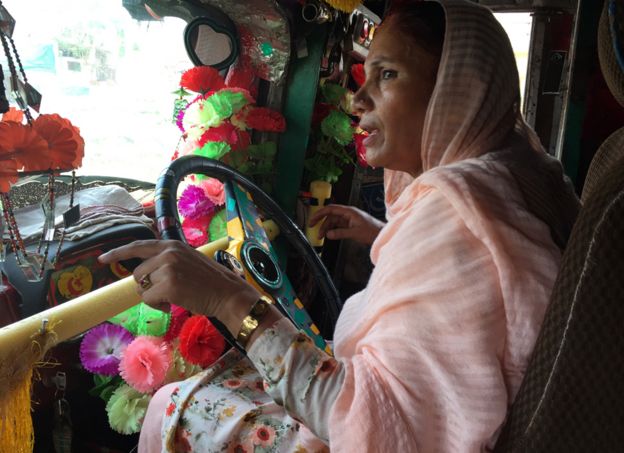

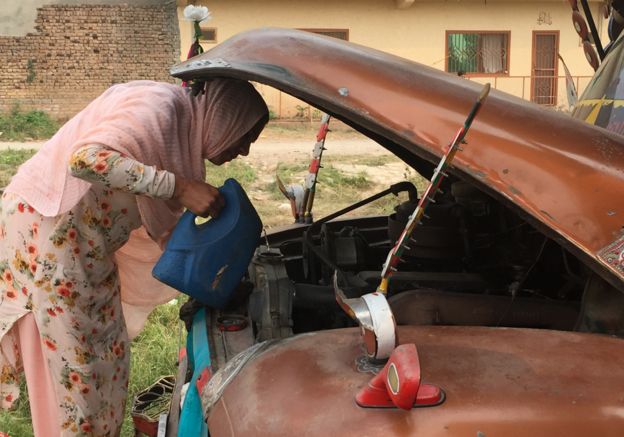
There are some who would argue that women actually make better lorry drivers than men.
Ellen says companies in the US are learning that women take fewer risks, and are less likely to have high-speed collisions. Companies often tell her, she adds, that women drivers are "so much better with the customers and the paperwork and the equipment".
Natalie's employers, Brenda and Steve Ward of Ward Brothers in Middlesbrough, currently have just three women drivers among 120 men, but say they would like more.
"As women they tend to be looked at as weak and not really up to the work, but they hold their ground and get on with it to prove their point," Brenda says.
In fact, she says, they are as strong as any of the men.
"They seem very good at their job, they don't cause a lot of issues, and they are dedicated to what they are doing."
Women drivers get paid exactly the same as the men at Ward Brothers, and in both the UK and the US you can be earning a "living wage", as Ellen puts it, after just a few weeks of training.
Natalie says she is "making something of her life". It suits her better than the beauty or care sectors, where many of her friends work, and gives her a sense of freedom. She describes her lorry as her "office on wheels".
"It's basically my workspace," she says. "I'm in control."



1 comment:
I love that picture. I was in India for several years and then in Nepal for a few. The festival of machines is a strange day. It makes you feel like you are living in a make believe place. It is very beautiful and in a sense, magical. I would have to say that it was one of my favorite.
Kourtney Heard @ Hansen & Adkins Auto Transport
Post a Comment